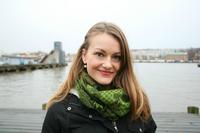Studying the Master’s in Language and Intercultural Communication programme
Interview with Lorna, student
“I wanted to do something for society”
Lorna is studying the Master’s in Language and Intercultural Communication programme. For a long time, she thought it would be difficult to find a job with a degree in languages. But it wasn’t! Before she had finished the programme, she had already found two jobs that suited her perfectly.
“One of my jobs is at Chalmers University of Technology as a project assistant in a project that is a collaboration with GU’s Department of Applied Information Technology. The project is called Integration with Mobile - Minclusion and aims to develop digital tools that support languages and intercultural communication. For example, I am involved in a case study with Swedish for Immigrants (SFI) students who are working with a language app to learn Swedish. With the help of surveys and interviews, we will then evaluate what works well and what needs to be improved to support the integration of recently arrived Arab-speaking immigrants to Sweden.”
How did you get that job? Chalmers is not the first place you would think of when you are studying a languages degree.
“The project was looking for a person with experience in developing apps and with skills in Arabic and intercultural communication. That was my background in a nutshell! I have a Bachelor’s degree in Arabic and I also studied Arabic as my main field of study in the Master’s in Language and Intercultural Communication programme. As part of my Master’s thesis, I had developed a communication app for people with Arabic as their mother tongue. So everything sort of came together in that job: Arabic, intercultural communication and my social engagement.”
What do you mean by your social engagement?
“I didn’t really have a definite plan when I chose to study Arabic. I wanted to do something with social relevance, considered studying social psychology, and felt that Arabic could prove to be a useful language in my future working life. I tried it for a semester and loved it! Once I had studied Arabic up to Bachelor’s degree level, I chose the Master’s in Language and Intercultural Communication programme to get a broader social perspective on languages. In the programme, we studied a course on languages and society and I became particularly interested in minority languages and the relationship between languages and human rights.”
And you have also got a job at Sahlgrenska University Hospital, haven’t you?
“That job came in the wake of my language app in Arabic. I work at DART, a communication and data resource centre, within a project called KomHIT Flykting (Come here refugee) which is developing multilingual material with pictures to facilitate communication with new immigrants in the healthcare sector. The idea comes from speech-language pathology and the area of Augmentative and alternative communication (AAC), which uses images to help people with speech difficulties. I based my work on the same idea – using images as support for communication, in my language app for Arabic speakers. So it’s really a lot of fun to work on this project! At the moment I am working on finalising material for the project’s website and will soon make my first official visit to a hospital that is involved in the project.”
It sounds like your studies in Arabic have played a key role in finding jobs. What have you got out of your studies in intercultural communication?
“As I said, I chose intercultural communication because I wanted to study something with more social relevance, but if I look back, the theoretical depth in the programme in combination with Arabic have been very useful. In hindsight, it feels like good preparation for what I’m working with today. Studying at second-cycle level is of course just the last stage before doctoral studies, and that’s been very good for me in the research project at Chalmers.”
What are your plans for the future?
“It would be nice to be able to continue to do research, preferably as a doctoral student. During my studies I have developed an interest in Arabic, intercultural communication and how to use various tools and aids to promote communication. As a doctoral student, I could develop this interest further and run my own research project. We will see what happens!”
More information
Do you have a Bachelor’s degree and are you interested in studying the same Master’s programme as Lorna?
Talk to a study counsellor!
Read more about the Master’s in Language and Intercultural Communication programme
Study here - Department of Languages and Literatures
